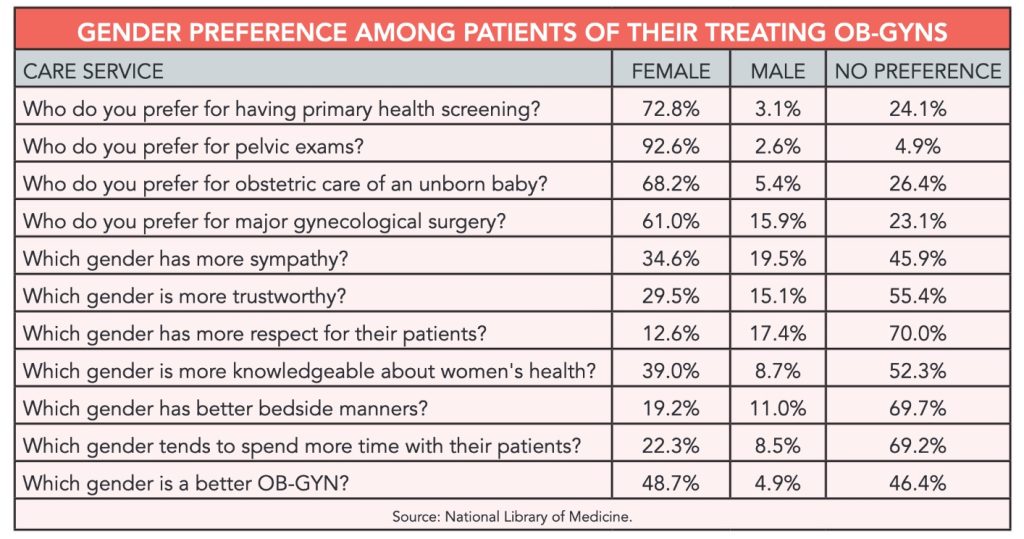For many patients, the quality of their OB-GYN care and their preference for a woman tops their list of considerations when they search for their ideal doctor. A female OB-GYN, local patients note, identifies better with their concerns and they are not as hard to find as they were to five to 10 years ago.
Over the past few decades, more and more OB-GYN physicians are female, and this ratio is growing. Nationally, approximately 60% of practicing OB-GYNs are female, according to the most recent 2020 report by the Association of American Medical Colleges.
“There has been a steady increase in the number of female OB-GYNs in South Carolina, mirroring these national trends,” noted Dr. Berry Campbell, the immediate past president of the South Carolina OB/GYN Society.
Today about half of all medical students are female. But according to the AAMC, 86% of the new physicians who have chosen OB-GYN as a specialty for their training are female. These women will become the OB-GYNs of the next 10, 20 and 30 years and possibly longer if the trend continues.
Dr. Campbell sees this same trend close to home where “90% of the recent applicants for OB-GYN residency at the Medical University of South Carolina were female. In their most recent residency class, out of 20 residents, only one was male.”
“My No. 1 priority in choosing an OB-GYN is finding a female. When I say that I have a concern, a woman can say that she has had the same concern or maybe has experienced a similar pain,” explained Meghan, a 53-year-old Charleston resident. “I also carefully consider the age of the practitioner, areas of specialty, office location and whether they are in the same health care system as my other providers.”
Similarly, Gretchen, a Keowee Key resident in her 70s, sayid when considering an OB-GYN, her top priority is that the doctor is a woman. She said she will also “check their credentials and reviews online, the distance to her office, and, importantly, the quality of the clinic or office she is in.”
“It seems when [male doctors] can’t figure out a medical problem, they presume it must be stress,” Gretchen asserted. “That story gets old. Women understand the multiple roles of a woman and look into a situation further to make sure there is no medical reason for symptoms before going down the stress road.”
Gretchen’s assertions are closely linked to the trending term “medical gaslighting,” when a health care provider dismisses a patients’ worries, minimizes their symptoms or makes them feel like their symptoms are imagined.
According to Melinda Wenner Moyer’s 2022 New York Time’s article “Women are Calling Out ‘Medical Gaslighting,’” “the term ‘gaslighting’ derives from a play called ‘Gaslight’ about a husband’s attempt to drive his wife insane. And many patients, particularly women and people of color, describe the search for accurate diagnosis and treatment as maddening.”
“We know that women, and especially women of color, are often diagnosed and treated differently by doctors than men are, even when they have the same health conditions,” explained Karen Lutfey Spencer, a researcher quoted in Moyer’s piece who studies medical decision-making at the University of Colorado, Denver.
Some women lean on nurse midwives, who are predominantly female, for their OB-GYN care.
“We work with women from an early age through menopause,” said Barbara Davenport, CNM, a certified nurse midwife at Prisma Health in Greenville.
Many female patients prefer to work with a female practitioner because they can “identify more with someone who has had similar experiences,” Davenport noted. “When a patient has a health practitioner who she can relate to, it often builds confidence in the relationship.”
As a midwife, Davenport strives to “help women understand and trust their bodies.”
Throughout Dr. Campbell’s experience, quality care is patients’ top priority: “Most people believe if a doctor provides a high quality of care, they will not care if they are a male or female.”
Patients typically consider technical skill, compassion and experience as part of their evaluation, and a male OB-GYN may check the boxes best for them. Many women have a relationship built over the years with their male OB-GYN and the trust they place in him has grown.
For women who live in more rural areas of South Carolina, Dr. Campbell explained, the most important consideration may become the availability of physicians, rather than the physician’s characteristics or background. The potentially smaller number of male physicians in these areas may not trouble some women who may not be able to, or may not wish to, travel a great distance for their visits.
Medical Gaslighting Source: nytimes.com/2022/03/28/well/live/gaslighting-doctors-patients-health.html
By Lisa Wack








